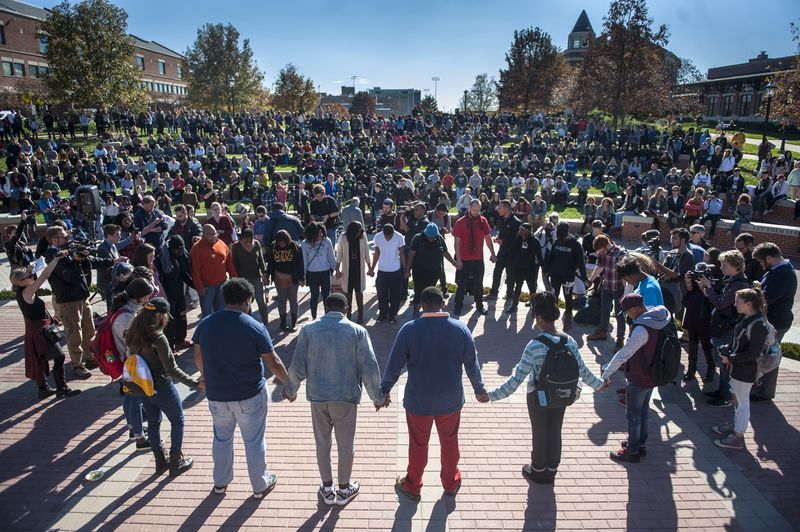The current narrative on college students is they are overindulged hothouse flowers who will wilt if exposed to the cold vapors of reality.
Credit: Maureen Downey
Credit: Maureen Downey
That view has been fed by student protests that began at the University of Missouri and Yale but spread to campuses nationwide. The Missouri protests led to the resignation of the president of the university system and the chancellor of the flagship campus.
While the protests are largely focused on legitimate race issues on the campuses, students in some places have expanded to a list of offenses big and small.
As Columbia journalism professor Todd Gitlin wrote in The New York Times:
Why such a widespread and bristling feeling of acute vulnerability followed by attacks on those who disagree? Why the lust for "safe spaces"? Why the clamor for "trigger warnings"? (At my own university, Ovid's "Metamorphoses" came off the syllabus for a required core course after some students objected to Ovid's accounts of rape.) Why do so many students see themselves as so vulnerable to the slings and arrows of outrageous texts, arguments, comments? Why so fearful?
Oklahoma Wesleyan University President Everett Piper was a bit blunter in his response to a student on his campus who complained that a university chapel service offended his sensibilities and made him feel uncomfortable.
In a searing blog , Piper wrote in part:
I have a message for this young man and all others who care to listen. That feeling of discomfort you have after listening to a sermon is called a conscience. An altar call is supposed to make you feel bad. It is supposed to make you feel guilty. The goal of many a good sermon is to get you to confess your sins—not coddle you in your selfishness. The primary objective of the Church and the Christian faith is your confession, not your self-actualization.
So here's my advice: If you want the chaplain to tell you you're a victim rather than tell you that you need virtue, this may not be the university you're looking for. If you want to complain about a sermon that makes you feel less than loving for not showing love, this might be the wrong place.
If you're more interested in playing the "hater" card than you are in confessing your own hate; if you want to arrogantly lecture, rather than humbly learn; if you don't want to feel guilt in your soul when you are guilty of sin; if you want to be enabled rather than confronted, there are many universities across the land (in Missouri and elsewhere) that will give you exactly what you want, but Oklahoma Wesleyan isn't one of them.
At OKWU, we teach you to be selfless rather than self-centered. We are more interested in you practicing personal forgiveness than political revenge. We want you to model interpersonal reconciliation rather than foment personal conflict. We believe the content of your character is more important than the color of your skin. We don't believe that you have been victimized every time you feel guilty and we don't issue "trigger warnings" before altar calls.
This is not a day care. This is a university!
The students have their defenders, although they have many more critics contending these protests are the result of giving every kid a trophy. (Do kids even want those dime-store trophies?)
Writing in The Nation, Bruce Shapiro said students deserve respect and support.
He wrote: (This is a short excerpt. You can read his full piece here.)
People, we live in a post-traumatic culture. You can't ask the world to embrace the psychological injuries of combat veterans and 9/11 survivors and at the same time expect students of color to shut up about the emotional legacies of racism. You can't expect female students to shut up about the stresses and complexities of living on campuses that until very recently were as complicit in covering up sexual assaults as the archdiocese of Boston. And once the history of violence is on the table, you can't expect anything but a contentious and challenging conversation.







